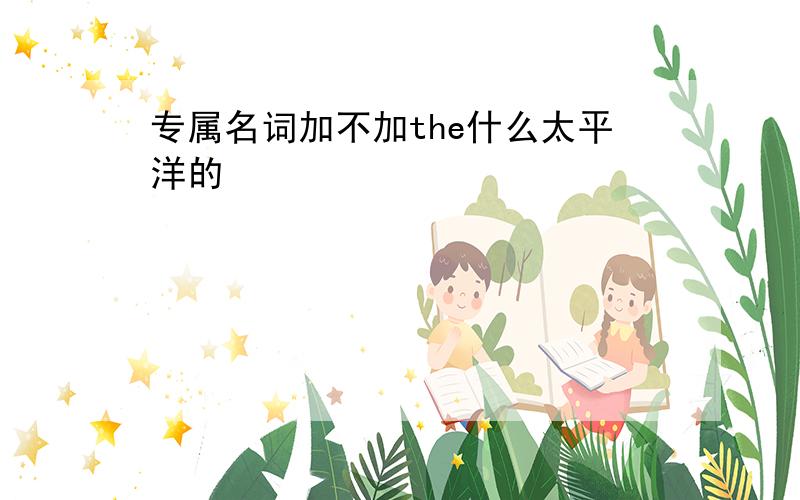专属名词加不加the什么太平洋的
来源:学生作业帮 编辑:神马作文网作业帮 分类:英语作业 时间:2024/11/11 04:49:45
专属名词加不加the
什么太平洋的
什么太平洋的

加.
介绍下定冠词the的用法
1.特指某(些)人或某(些)物,这是定冠词的基本用法.
Beijing is the capital of China.北京是中国的首都.
2.指谈话双方都知道的人或事物.
Open the window please.请把窗户打开.(双方都知道指的是哪一扇窗户)
3.指上文已经提到的人或事物.
There was a chair by the window.On the chair sat a young woman with a baby in her arms.
窗户附近有一把椅子.椅子上坐着一位年轻妇女,怀里抱着一个婴儿.
4.指世界上独一无二的事物.
Which is the biggest,the sun,the earth or the moon?太阳、地球和月亮哪一个最大?
5.用在序数词、形容词最高级前.
The first truck is carrying a few baskets.第一辆卡车装运一些筐.
6.用在由普通名词构成的专有名词前.
the Great wall长城,the Summer Palace颐和园,
the People’s Farm人民农场,the Science Museum科学馆
7.用在某些形容词前,表示某一类人.
the rich富人 the poor穷人 the sick病人 the old老人,
the young年轻人 the blind盲人 the dead死人
8.用在姓氏复数形式前,表示“全家人”或“夫妇俩”.
The Turners are going home on a train.特纳夫妇在回家的火车上.
9.用在方位词前.
on the left/right在左/右边
in the east/west/north/south在东/西/北/南方
at the back/front of在……的后/前面
10.用在乐器名称前.
Do you like playing the piano or the violin?你喜欢弹钢琴还是喜欢拉小提琴?
11.用在表示海洋、河流、山脉、群岛及国家和党派名词前.
the East China Sea 东海the Huai River 淮河
the Jinggang Mountains 井冈山the United States of American 美国
12.用在某些固定词组中.
all the same 仍然all the time 一直
all the year round 一年到头at the age of 在……岁时
at the beginning of 起初; 开始at the end of 在……的尽头/末尾
at the entrance of 在……门口at the foot of 在……脚下
at the head of 在……的前面at the moment 此刻
at the same time 同时by the side of 在……附近
by the time 到时候by the way 顺便说
catch the post 赶上邮班do the shopping/washing 买东西/洗衣服
give...the message 捎口信给……go to the classroom 去教室
in the end 最后;终于in the hat 戴帽子的
in the middle of the day 中午in the morning/afternoon / evening 在上午/下午/晚上
in the open air 在户外;在野外jump the queue 不按次序排队
lead the way to 引路;指路look the same 看起来很像
on the earth 在地球上tell the truth 说实话
the day after tomorrow 后天the day before yesterday 前天
the high jump 跳高the long jump 跳远
the next day 第二天the next year下一年
the people 人民the starting line起跑线
介绍下定冠词the的用法
1.特指某(些)人或某(些)物,这是定冠词的基本用法.
Beijing is the capital of China.北京是中国的首都.
2.指谈话双方都知道的人或事物.
Open the window please.请把窗户打开.(双方都知道指的是哪一扇窗户)
3.指上文已经提到的人或事物.
There was a chair by the window.On the chair sat a young woman with a baby in her arms.
窗户附近有一把椅子.椅子上坐着一位年轻妇女,怀里抱着一个婴儿.
4.指世界上独一无二的事物.
Which is the biggest,the sun,the earth or the moon?太阳、地球和月亮哪一个最大?
5.用在序数词、形容词最高级前.
The first truck is carrying a few baskets.第一辆卡车装运一些筐.
6.用在由普通名词构成的专有名词前.
the Great wall长城,the Summer Palace颐和园,
the People’s Farm人民农场,the Science Museum科学馆
7.用在某些形容词前,表示某一类人.
the rich富人 the poor穷人 the sick病人 the old老人,
the young年轻人 the blind盲人 the dead死人
8.用在姓氏复数形式前,表示“全家人”或“夫妇俩”.
The Turners are going home on a train.特纳夫妇在回家的火车上.
9.用在方位词前.
on the left/right在左/右边
in the east/west/north/south在东/西/北/南方
at the back/front of在……的后/前面
10.用在乐器名称前.
Do you like playing the piano or the violin?你喜欢弹钢琴还是喜欢拉小提琴?
11.用在表示海洋、河流、山脉、群岛及国家和党派名词前.
the East China Sea 东海the Huai River 淮河
the Jinggang Mountains 井冈山the United States of American 美国
12.用在某些固定词组中.
all the same 仍然all the time 一直
all the year round 一年到头at the age of 在……岁时
at the beginning of 起初; 开始at the end of 在……的尽头/末尾
at the entrance of 在……门口at the foot of 在……脚下
at the head of 在……的前面at the moment 此刻
at the same time 同时by the side of 在……附近
by the time 到时候by the way 顺便说
catch the post 赶上邮班do the shopping/washing 买东西/洗衣服
give...the message 捎口信给……go to the classroom 去教室
in the end 最后;终于in the hat 戴帽子的
in the middle of the day 中午in the morning/afternoon / evening 在上午/下午/晚上
in the open air 在户外;在野外jump the queue 不按次序排队
lead the way to 引路;指路look the same 看起来很像
on the earth 在地球上tell the truth 说实话
the day after tomorrow 后天the day before yesterday 前天
the high jump 跳高the long jump 跳远
the next day 第二天the next year下一年
the people 人民the starting line起跑线